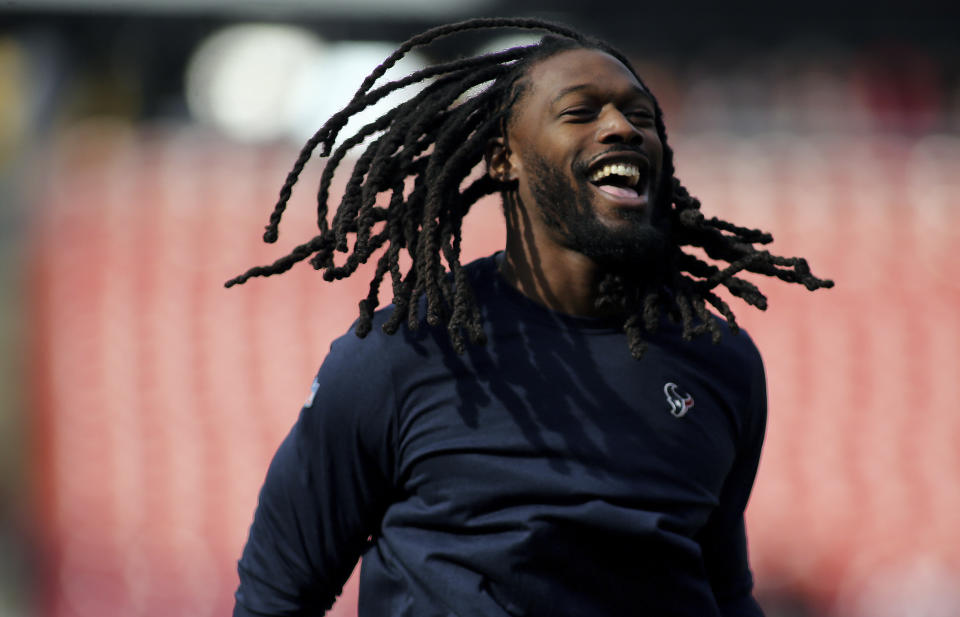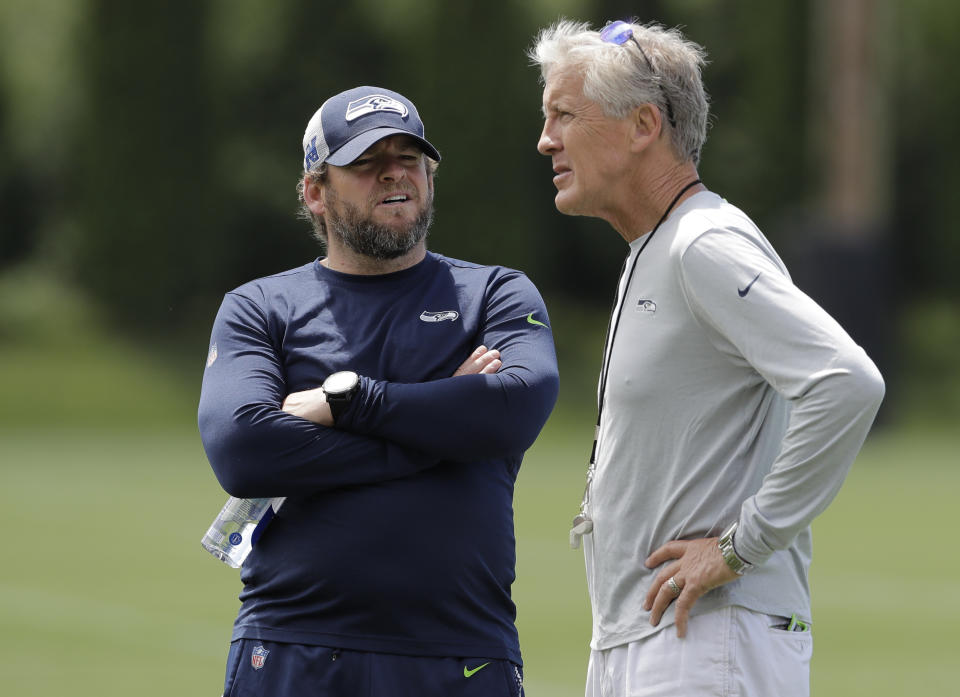Texans learn hard lesson in getting fleeced for Jadeveon Clowney
You want to know what happens when a front office gets backed into a corner in the National Football League? It ends up getting fleeced.
And make no mistake about it, that’s exactly what happened to the Houston Texans on Saturday when they dealt defensive end Jadeveon Clowney to the Seattle Seahawks for a third-round pick in 2020 and outside linebackers Barkevious Mingo and Jacob Martin.
Never mind the fact the trade didn’t address the Texans’ biggest issue, an undermanned offensive line that let star quarterback Deshaun Watson — who was sacked a league-high 62 times last season — get hit so much that in some games, I swear he started stumbling around like Rocky in Creed-Balboa 1. Let’s just put that aside.
No, the bigger issue with this trade is that the Texans basically got nothing right before the season for an insanely gifted 26-year-old who plays an impact position, and it happened because — in the most dramatic blunder of the offseason — the Texans failed to unload their franchise-tagged defense end before the draft.
Sure, hindsight is 20/20. But the Texans don’t need to look any further than their most recent trade partner to understand the importance of quickly offloading an expensive, franchise-tagged defensive end they didn’t want to pay. When faced with the same situation this offseason, the Seahawks moved Frank Clark to Kansas City for a first-round pick in 2019 and a second-round pick in 2020.

Why? Because they knew, in today’s day and age, a franchise-tagged player is no longer a guarantee to just show up before the start of the season if a deal doesn’t get done by the July 15 deadline. The Le’Veon Bell situation in Pittsburgh was the first instance of a player missing the whole season, but with Bell basically getting a year off while still securing the bag this offseason from the Jets, you better believe other players took notice … including Clowney, who was reportedly willing to miss regular-season games as he awaited a resolution to his contract situation.
So in lieu of that, the Texans, who stood to get a compensatory third-rounder in 2021 for Clowney if they had let him sit out and sign elsewhere next March, opted to get their third a year early with two adequate replacements in Mingo, 28, and Martin, 23.
And while Clowney has his question marks — particularly as it relates to his passion for the game of football — neither player is close to being in his class. By every measure, Clowney is an outstanding run defender (there’s zero debating this) and an above-average pass rusher. His loss will be felt in Houston.
[Watch live NFL games on the Yahoo Sports app, download it here.]
But again, this is what happens when you don’t — or can’t — find a trade partner for a franchise-tagged player before the draft. Why? Because suitors for such players will want to lock them down to a contract extension before the July 15 deadline to do so. At this point of the year, any team that traded for Clowney couldn’t sign him to a contract extension until the end of the season, making clubs reticent to give up any assets.
Another team that understood this, by the way, was the Chiefs, who dealt their own franchise-tagged defensive end Dee Ford to the San Francisco 49ers for a 2020 second-round pick. Even that would have been a better deal for the Texans than what they got.
To be fair, the Texans did shop Clowney this spring. In fact, a source told Yahoo Sports that shortly before the Chiefs completed the trade with Seattle for Clark, the Texans tried to engage the Chiefs in discussions for Clowney. Kansas City, which had locked on Clark by that point, was uninterested, steering the Texans on a course that ended in Saturday’s disappointing development.
But the word “disappointing” only applies to Houston in this trade. For Seattle, the trade is basically risk-free, and an indication that general manager John Schneider hasn’t lost his fastball. Just five months after trading Clark for a pair of picks, Schneider — in one fell swoop — found a more-than-capable replacement in Clowney.

For the record, Clark has proven to be a more impactful player. Though the two are the same age (26), Clark’s motor not only runs way hotter, he’s also a better pass rusher and possesses better on-field leadership traits. That’s why the Chiefs chose Clark over Clowney this spring.
But if you believe the contract season is undefeated, as I indeed do, it’s not a stretch to believe Clowney will produce a career year in Seattle this season, statistically. In fact, I’d even say it’s a safe bet.
With a monster season — and we’re talking a hypothetical 13 sacks and 27-plus pressures here, numbers that would have placed him in the top-five among defensive ends statistically last season — Clowney will position himself to command next spring something similar to the five-year, $104 million deal Clark got from the Chiefs.
Nothing motivates like money, and by making the trade, the Seahawks are positioning themselves to benefit from that in a year in which they still have Super Bowl aspirations.
And the best part about it is, if the Seahawks don’t believe in Clowney’s fiber, and if they are given any reason to feel antsy about paying him that type of money long-term, they can either franchise him again or let him walk in free agency. If they choose the latter, they’ll likely get a third-round pick back in a year via the NFL’s compensatory system. Like I said, it’s a no-risk proposition for them.
But no matter what, the Seahawks will likely franchise Clowney next offseason. If they love him, they’ll do it to ensure he returns to the negotiating table. If they like him but don’t want to pay him, they’ll do it and simply deal him before the draft.
After all, as he proved on Saturday, Schneider remains one of the league’s best general managers, and the best organizations in the NFL don’t let themselves get backed into a corner. They know what happens when they go down that road, and if the Texans didn’t know it before this weekend, they surely do now.
More from Yahoo Sports:
